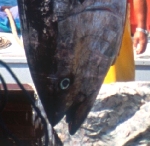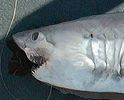Governor of Hawaii, Linda Lingle, has signed into law a ban on shark-fin soup beginning July 1st, 2011, according to Reuters. The soup is currently served in a number of Chinese restaurants in Hawaii, but the trade has decimated certain shark species due to overfishing.
Restaurants will be allowed to finish their inventory of shark fin, but after next July fines will run from a low of $5,000for a first offense to a high of $50,000 and up to a year in jail for the third offense.
Between 26 and 73 million sharks are killed annually for their fins to produce the high-end delicacy in Asia. Sharks are brought aboard ships where their fins are cut off then they are thrown back into the water—often still alive—where they succumb to their injuries.
The trade is seen as the primary driver behind drastic declines in many shark species. The scalloped hammered population has dropped by 98 percent in some regions, while the oceanic whitetip shark has declined by 90 percent in the central Pacific Ocean and 99 percent in the Gulf of Mexico. The IUCN Red List has found that 32 percent of open ocean sharks and rays are currently threatened with extinction, a much higher percentage than mammals or birds.
Earlier in the year eight shark species failed to gain international protection at the Convention on International Trade in Endangered Species (CITES). Pressured by Japan, votes to protect sharks and other marine species failed time and again.
While Hawaii’s market for shark fin soup is tiny compared to China and Japan, the law is seen as largely symbolic of the need to protect sharks. Hawaii will be the first US state to have such a ban.
Related articles
History repeats itself: the path to extinction is still paved with greed and waste

(04/05/2010) As a child I read about the near-extinction of the American bison. Once the dominant species on America’s Great Plains, I remember books illustrating how train-travelers would set their guns on open windows and shoot down bison by the hundreds as the locomotive sped through what was left of the wild west. The American bison plunged from an estimated 30 million to a few hundred at the opening of the 20th century. When I read about the bison’s demise I remember thinking, with the characteristic superiority of a child, how such a thing could never happen today, that society has, in a word, ‘progressed’. Grown-up now, the world has made me wiser: last month the international organization CITES (Convention on International Trade in Endangered Species) struck down a ban on the Critically Endangered Atlantic bluefin tuna. The story of the Atlantic bluefin tuna is a long and mostly irrational one—that is if one looks at the Atlantic bluefin from a scientific, ecologic, moral, or common-sense perspective.
CITES chooses ‘commerce’ over sharks, leaving endangered species vulnerable

(03/23/2010) Only the porbeagle shark received protection today from the Convention on International Trade in Endangered Species (CITES). Seven other shark species failed to win international protection despite plummeting populations due to overfishing. Once again, Japan led the opposition to regulating the trade in white-tipped sharks and scalloped hammerheads, including two look-alike species: the great hammerhead and the smooth hammerhead. Japan has dominated the CITES meeting, successfully leading resistance to banning the trade in the Critically Endangered Atlantic bluefin tuna and against monitoring the coral trade.
(03/17/2010) An effort to bolster conservation measures for plummeting shark populations was defeated yesterday at the Convention on International Trade in Endangered Species (CITES), according to the AP. The nonbinding measure would have increased transparency in the shark trade and produced research on illegal fishing for sharks.














